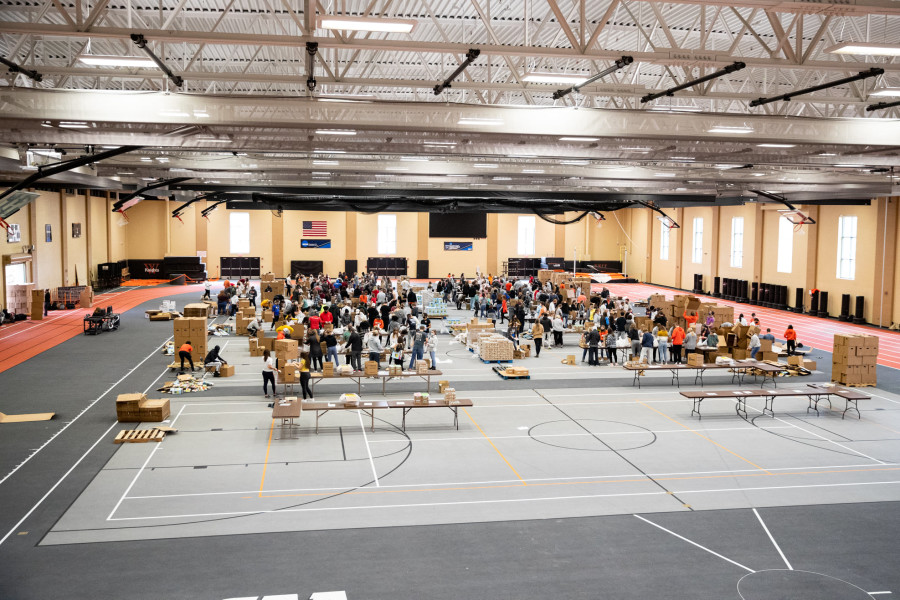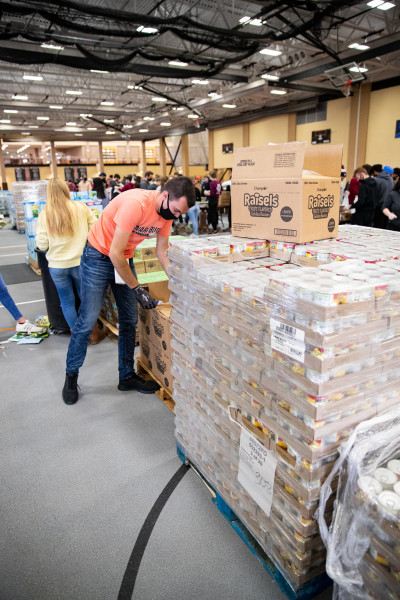
At Wartburg College, students are called to live out lives of leadership and service from the moment they are welcomed into the community as Knights. Jared Feigenbaum, a senior social work major from Marion, has embraced this challenge through leadership roles with Students UKnight, Orientation staff, Dance Marathon and the Homecoming Committee.
He also is a Baldwin Leadership Fellow, a program run through the college’s Institute for Leadership Education. As the culminating piece of his fellowship, Feigenbaum organized a backpack pack through the Northeast Iowa Food Bank that resulted in 14,880 bags of food (that’s 62 pallets and three semi loads) for students in Northeast Iowa. Each month, the NEIFB serves about 4,100 students at 145 different schools through the program, which sends students home with filled bags to supplement their weekend meals.
“I knew I wanted my leadership project to be service related. I had tossed around several different ideas, and then, while working with my advisers and mentors, I landed on this backpack pack,” Feigenbaum said. “Jill Krall at the United Way was a great resource for this project. She has so many great connections and has been the one I looked to for guidance throughout the planning process.”
Shortly after connecting with the food bank, Feigenbaum reached out to another mentor, Lindsay Leonard, Wartburg’s director of student engagement and co-director of the college’s first-year Inquiry Studies program.
“We agreed that this project would be a great opportunity for the IS 101 students. In IS 101, a course all first-year students must take, the common content is centered around the Wartburg College pillars, and this project aligns with the service aspect,” Feigenbaum said. “We worked together to get it passed as common content and ready for students this fall. I created worksheets, found videos and readings, and planned the actual event throughout much of 2020.”

Though the pandemic nearly ended Feigenbaum’s project this fall — his original pack event was scheduled for Sept. 11, when the college was battling increasing numbers of COVID-19 cases on campus — he persisted through each challenge. Finally, on Oct. 26, he was able to gather about 400 students, faculty and staff in the Wartburg-Waverly Sports & Wellness Center to complete the pack.
“Twenty-twenty has been a tough year, but this event allowed students to safely be in community with one another all while making a difference,” said Feigenbaum, who worked closely with college leadership to ensure the event followed all campus coronavirus safety protocols, including masking and distancing when possible. “More importantly, we were able to make a difference in what has been a tough year for many financially. More people are relying on programs like the backpack program to get by. We were able to use our privilege of being young and healthy and in a safe place to make a difference in the community.”
Alisha Rulapaugh, director of engagement for the food bank, said being able to host such a large pack off-site — only two Cedar Valley packs are bigger — was a blessing for the already busy staff and on-site volunteers. Though the decrease in the number of volunteers helping the food bank wasn’t as large as they had originally prepared for, the increase in use has made for a tough year.
Before the pandemic, the NEIFB served about 42,000 food-insecure clients in 16 counties. Today, that number is projected to be about 53,000, Rulapaugh said.
“Unfortunately, our increase during that time was actually probably greater than 11,000 because that 42,000 had been projected to go down on our next survey, but because of the timing it never happened,” she said. “We have so many people needing services now more than ever.”
Though Feigenbaum graduates in May, he’s hopeful this event will continue to be part of the college’s IS 101 curriculum. Rulapaugh said it is definitely something she would like to see get approved while Feigenbaum is interning at the food bank in early 2021.
“I think this is a really important opportunity, as it allows people, and specifically our first-year students, the opportunity to learn and serve alongside their peers,” Feigenbaum said. “It gives them the opportunity to make a difference in their community in just a short period of time. My hope for this project is that by offering a small opportunity for students to experience serving others that it will promote an interest in serving both the community here during their time as a student but also around the country in whatever community they end up in after graduation.”
